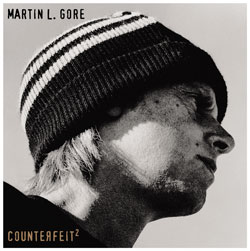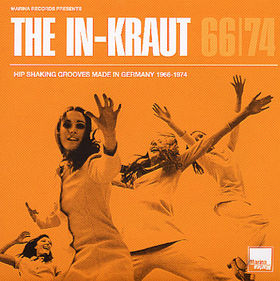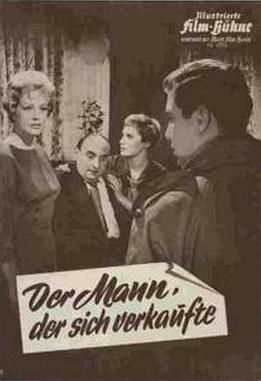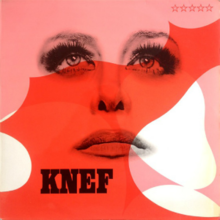
Hildegard Frieda Albertine Knef was a German actress, singer, and writer. She was billed in some English-language films as Hildegard Neff or Hildegarde Neff.

A Little Touch of Schmilsson in the Night is a 1973 album of classic 20th-century standards sung by American singer Harry Nilsson. The album was arranged by Frank Sinatra's arranger Gordon Jenkins, and produced by Derek Taylor.

Orchestra Baobab is a Senegalese band established in 1970 as the house band of the Baobab Club in Dakar. Many of the band's original members had previously played with Star Band de Dakar in the 1960s. Directed by timbalero and vocalist Balla Sidibé, the group featured saxophonists Issa Cissoko and Thierno Koité, two singers, two guitarists and a rhythm section with drums, congas and bass guitar. Since their formation, the band has predominantly played a mix of son cubano, Wolof music, and to a lesser extent Mande musical traditions. Following the deaths of Cissoko in 2019 and Sidibé in 2020, Thierno Koité has become the leader of the band.

Time and a Word is the second studio album by English rock band Yes, released on 24 July 1970 by Atlantic Records. It was put together several months after the release of the band's 1969 eponymous debut, during which they continued to tour heavily and recorded Time and a Word during gaps between shows. Yes continued to follow their early musical direction of performing original material and cover versions of songs by pop, jazz, and folk artists. A small orchestra of brass and string session musicians was used on most of the album's songs.

Counterfeit² is the first full-length studio album by Martin Gore, the primary songwriter for the band Depeche Mode, and his second release.

Extrabreit is a German band established in Hagen, Germany in 1978. The band was one of the most successful exponents of the Neue Deutsche Welle movement of the 1980s.

The In-Kraut: Hip Shaking Grooves Made in Germany 1966-1974 is the first volume in The In-Kraut series released by Marina Records on compact disc and double vinyl in 2005.

Vulnerable is the third posthumous album by Marvin Gaye. Recorded in sessions throughout 1977, the album was a decade in the making, first being worked on in 1968 during sessions in New York with Bobby Scott. Reworked by Gaye a decade later, the album was originally going to be released in 1979 under the title, The Ballads, but was shelved. Two decades later, Motown released it under the title Vulnerable, including seven songs from the sessions and three alternate cuts.
"Is That All There Is?", a song written by American songwriting team Jerry Leiber and Mike Stoller during the 1960s, became a hit for American singer Peggy Lee and an award winner from her album of the same title in November 1969. The song was originally performed by Georgia Brown in May 1967 for a television special. It was first recorded by disc jockey Dan Daniel in March 1968, but this was an unauthorized recording that, while played on Daniel's own radio show, went unissued at the songwriters' request. The first authorized recording was by Leslie Uggams in August 1968. Then came the hit Peggy Lee version in August 1969, followed by Guy Lombardo in 1969 and Tony Bennett on 22 December 1969.

"Gonna Give Her All the Love I've Got" is a 1967 Soul song, originally recorded and made a hit by Jimmy Ruffin on Motown's Soul Label imprint. Ruffin's 1967 original version, from his album Jimmy Ruffin Sings Top Ten, reached the Pop Top 30, peaking at #29, and was a Top 20 R&B Hit as well, peaking at #14. It was also a hit in Britain, reaching #26 on the UK Singles Chart. The song has a social context: it depicts a man anticipating his release from prison on the morrow, when he'll return home on a train to "the girl that I left behind," promising himself that he will reward her steadfast love for him by "giv[ing] her all the love [he's] got." The song was written by Norman Whitfield and Barrett Strong and produced by Whitfield.

Miloslav Ladislav "Ladi" Geisler was a German musician who established a high profile in the post-war German music scene. Best known for his work with pop musicians Bert Kaempfert, James Last and Freddy Quinn, Geisler developed the distinctive "Knack-Bass" percussive bass sound that helped popularize the Bert Kaempfert Orchestra. He later released numerous records under his own name.

"Something's Got a Hold on Me" is a song by American singer Etta James. The song was written by James, Leroy Kirkland and Pearl Woods, while production was handled by Leonard and Phil Chess. It was released in 1962 as the third single from her 1962 self-titled album as a 7" vinyl disc. Musically, "Something's Got a Hold on Me" is an R&B track with elements of soul, blues and gospel. Upon its release, the single was an R&B hit, peaking at number four on the Billboard Hot R&B Sides chart.
Auntie is a song released by Philips Records in 1972 to celebrate the fiftieth anniversary of the BBC. It is named after the affectionate nickname for the corporation, and featured artists from six countries. The singers are Hildegard Knef, Enrico Macias, Sandra & Andres, Alice Babs, Demis Roussos and Vicky Leandros. The composer is Dutch musician Hans van Hemert.

Nights on the Road is a 1952 West German drama film directed by Rudolf Jugert and starring Hans Albers, Hildegard Knef, Marius Goring and Lucie Mannheim.
Amadou Traoré, better known as Amadou Balaké, was a popular singer from Burkina Faso. During his career, which lasted over 50 years, Balaké recorded and performed in different parts of West Africa as well as New York and Paris. In the early 21st century, he was a member of Senegalese salsa band Africando. His music combined different traditions from his home country, primarily Dioula (Mandé) and Mossi, as well as Afro-Cuban music.

The Man Who Sold Himself is a 1959 West German crime film directed by Josef von Báky and starring Hildegard Knef, Hansjörg Felmy and Antje Weisgerber.

Miracles Still Happen is a 1951 West German romantic comedy film directed by Willi Forst and starring Forst, Hildegard Knef and Marianne Wischmann. It was intended by Forst as a more harmless follow-up to his controversial The Sinner which had also starred Knef. It was shot at the Bendestorf Studios and on location in Hamburg, Bavaria and Austria. The film's sets were designed by the art director Franz Schroedter and Karl Weber.
Songs of Berlin is an album by Marc Secara and the Berlin Jazz Orchestra, released digitally worldwide in October 2021 on GAM Records. The album features trombonist Jiggs Whigham and was arranged and conducted by Jack Cooper.
Journey to Happiness is a 1948 German romantic drama film directed by Erich Engel and starring Käthe Dorsch, Rudolf Forster and Hildegard Knef. It was made at the Babelsberg Studios in Berlin while location shooting took place around the Attersee (lake) in Austria.The film's sets were designed by the art director Erich Kettelhut. It was one of a significant number of films produced during Nazi Germany but not released until after the fall of the Nazi regime. It was originally made in 1944 during the Second World War, but its release was delayed by four years before it eventually premiered in the Soviet Zone.














